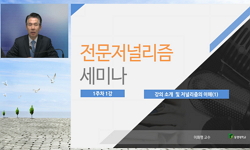The power of legacy media originated from material foundations, not contents. Legacy media has exercised its power through the control of means of publishing, namely rotary machines. Article 21 (3) of the Constitution reflects this. It states that “...
http://chineseinput.net/에서 pinyin(병음)방식으로 중국어를 변환할 수 있습니다.
변환된 중국어를 복사하여 사용하시면 됩니다.
- 中文 을 입력하시려면 zhongwen을 입력하시고 space를누르시면됩니다.
- 北京 을 입력하시려면 beijing을 입력하시고 space를 누르시면 됩니다.
https://www.riss.kr/link?id=A108267006
- 저자
- 발행기관
- 학술지명
- 권호사항
-
발행연도
2022
-
작성언어
Korean
- 주제어
-
KDC
360
-
등재정보
01
-
자료형태
학술저널
-
수록면
92-102(11쪽)
- 제공처
- 소장기관
-
0
상세조회 -
0
다운로드
부가정보
다국어 초록 (Multilingual Abstract)
The power of legacy media originated from material foundations, not contents. Legacy media has exercised its power through the control of means of publishing, namely rotary machines. Article 21 (3) of the Constitution reflects this. It states that “The standards of news service and broadcast facilities and matters necessary to ensure the functions of newspapers shall be determined by Act.” In the past, newspapers controlled production of information, publication of article, and distribution of newspaper. However, as big technology corporations virtually monopolized the news publishing and distribution process, the nature of legacy media has changed to be in charge of only production of information. The Constitutional Court of the Republic of Korea concluded, “Media diversity is an indispensable premise for democratic society based on pluralism.” However, as big technology corporations and algorithms intervened in news distribution, the market for diversity of opinions market has collapsed. The monopoly of the algorithm’s distribution of articles is unconstitutional. In order to realize diversity of public opinion in a new media environment, regulation must target an algorithm not a rotary press.
목차 (Table of Contents)
- 요약
- I. 서(序)
- II. 기사들이 낱개로 유통되면서 나타난 현상
- III. 가짜뉴스를 처벌할 필요조차 없는 시대
- IV. 윤전기의 소멸과 알고리즘의 등장
- 요약
- I. 서(序)
- II. 기사들이 낱개로 유통되면서 나타난 현상
- III. 가짜뉴스를 처벌할 필요조차 없는 시대
- IV. 윤전기의 소멸과 알고리즘의 등장
- V. 유능하기에 언론사를 떠나는 기자들
- VI. 기사 유통 독점의 위헌 가능성
- VII. 알고리즘도 헌법이 예정한 미디어
- VIII. 결(結)
- ABSTRACT
동일학술지(권/호) 다른 논문
-
저작권법 제126조의 해석론적⋅입법론적 개선방안 - 최근 4년간 저작재산권 침해 인용판결을 대상으로 -
- 서울대학교 기술과법센터
- 손수정
- 2022
- 01
-
- 서울대학교 기술과법센터
- 오오이시 마나
- 2022
- 01
-
이른바 ‘뒷광고’와 관련된 개인에 대한 제재의 현황과 정당성 검토
- 서울대학교 기술과법센터
- 박준석
- 2022
- 01
-
파라미터발명의 명확성 요건 - 화학 기계적 평탄화용 그루브형 연마 패드 사건 - [특허법원 2020. 5. 22. 선고 2019허2639 판결]
- 서울대학교 기술과법센터
- 이지영
- 2022
- 01




 코리아스칼라
코리아스칼라







